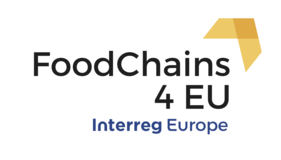The first Interregional Learning Event “Finances in the innovation process” gathered FoodChains 4 EU project partners and stakeholders to share how the innovations in food chain are supported and funded. Next to the project partners, the participants from Bulgaria were public authorities, universities and organizations that represents (among others) companies and forming the triple helix of the regional food chain. The event covered a full day program on May 19, starting with a visit to the technology offices and laboratories at UFT and to food companies accommodated within the University premises.
Students from the University demonstrated skills and knowledge in preparing and serving full set menu of a very high quality.
In the afternoon, a workshop took place in Grand Hotel Plovdiv with more than 50 participants both FoodChains 4 EU project partners and Bulgarian Governmental and business support organizations, food and distribution companies and R&D experts in food production, packaging and distribution.
The Deputy Governor of Plovdiv Region, Deputy Major of Plovdiv, Director of Regional SME Support Agency gave a worm welcome to the participants.
The presentations and discussions outlined what the strong sides and the needs of the different participants in the creation, marketing and distribution of high quality innovative food products are. A clear view on how this process is organized in Bulgaria has been provided by academia and business representatives.
Food is very important sector for regional and national economies in the FoodChains 4 EU partner countries. Thus, the project objectives to boost innovation in the food chains, guarantee ssustainable processing & distribution and healthy, tasty and personalized food for specific target groups raises special attention in the society.
During the workshop new food packaging materials and techniques have been presented like active packaging containing nanostructured titanium dioxide materials with superior preservation properties and new materials for bottling of water.
Ranges of financial support for innovation have been shared by Emilia Romania, Great Manchester and Flevoland Regions. Number of good practices for transfer of knowledge gave clear idea how academia and business collaborate for development of innovative food products.
The rich historical and cultural heritage of Sofia and Plovdiv cities dating from 7 – 8 thousand years was shared with all participants in the Interregional learning event.

